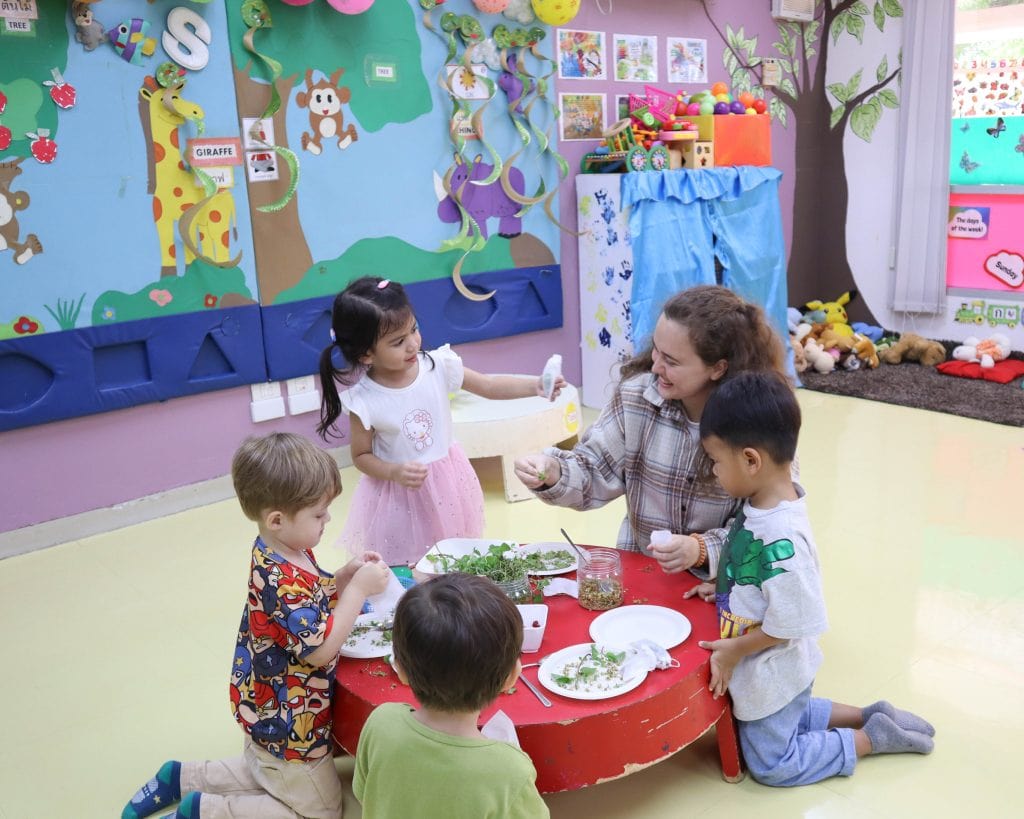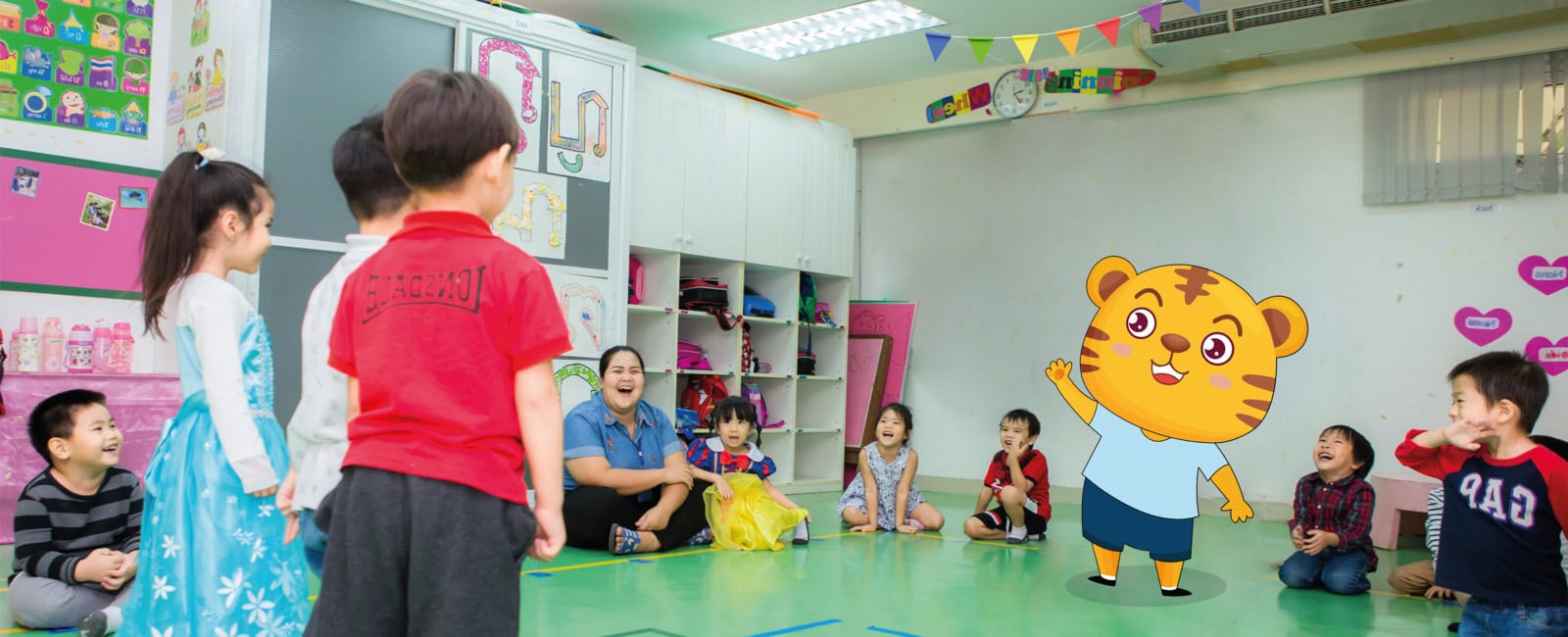SBS Tiger Cubs
What is SBS Tiger Cubs?
Introducing SBS Tiger Cubs; a wonderful preschool journey dedicated to nurturing early childhood development and cultivating school readiness. Our innovative approach encompasses a diverse range of tailored programs to cater to a myriad of individual needs. Under the guidance of seasoned early childhood educators, each program unfolds within a secure and nurturing learning environment.
Immersed in purposeful design, our programs are meticulously crafted to propel the initial stages of growth. From perfecting gross and fine motor skills to fostering early communication, sensory exploration, and the cultivation of essential social competencies – every area of early development is nurtured. With its enriching and safeguarded setting, SBS Tiger Cubs emerges as the perfect nurturing ground for our youngest learners to embark on a transformative journey of learning, exploration, and boundless growth.
Preschool Education; Why wait?
The significance of early childhood learning cannot be overstated as it stands as a cornerstone in a child’s developmental journey. During these formative years, a child’s brain exhibits unparalleled growth, surpassing any other phase of their life. Research emphatically underscores that the initial three years witness the most profound expansion in the human brian. In this critical window, children actively cultivate essential social, emotional, and cognitive skills, setting the stage for their holistic growth.
These early years serve as the canvas upon which children begin their interactions with parents, teachers, peers, and the world at large. It;s within this period they embark on their voyage of acquiring fundamental life skills, learning to navigate emotions, and crafting cognitive pathways. To ensure these budding minds flourish, it is paramount they receive the precise nurturing and care. These formative experiences lay the bedrock for a future brimming with fulfillment, underscoring the profound impact of early childhood education.
| Tiger Cubs Pre-school (12 months-2 years) | (Mon-Fri) |
| Tiny Tots Preschool Experience (12 months-2 years) | (2-3 days per week) |
| BabySteps – Parent and Child Playgroup (0-3 years) | (1 day per week) |
| SBS Daycare (12 months-2 years) | (Mon-Fri) |

Tiger Cubs Pre-school
SBS Tiger Cubs is a preschool specifically tailored for children aged 12 months to 2 years. Designed as an enriching Playgroup experience within a secure and pristine setting, here toddler and babies can thrive in an environment created to foster growth and discovery. Our classes serve as a vital bridge, aiding little ones in transitioning from the comfort of home to the dynamic realm of schooling, supporting their entry into our mainstream toddler programme.
At Tiger Cubs Preschool, we passionately embrace the basic right of all children.- to play. We wholeheartedly believe that play-based learning is the perfect platform for your minds to navigate their surroundings and unravel the mysteries of the world. Within our immersive learning environment, our little explorers are immersed in a diverse array of activities that kindle their natural curiosity, embolden them to take risks, tackle changes, and nurture robust self-management skills. Here, children are nurtured to bloom, each moment evolving into an opportunity for joyful exploration and profound learning.
At our Tiger Cubs there is a choice of full or half day experiences.
– Full Day
Time: 8:00am-14:30pm
Schedule:
9.00am-9.15am Morning Circle
9.15am-9.45am Sensory and Social Play
9.45am-10.00am Snack time
10.00am-10.30am Outdoor Exploration
10.30am-11.00am Music & Movement
11.00am-11.30am Visual Arts
11.30am-12.00pm Lunchtime
12.00am-13:30pm Naptime
13:30am-14:30pm Circle Time with Friends (Fun Activities)
Cost:
| Term Fee | |
|
Tiger Cubs Pre-School |
104,000 THB (Lunch Included) |
** Price does not include admission fee, student and security deposit, and campus development levy. Please speak to a member of our admission team for updates on monthly promotions and discounts.
– Half Day
Time: 9:00am-12:30pm
Schedule:
9.00am-9.15am Morning Circle
9.15am-9.45am Sensory and Social Play
9.45am-10.00am Snack time
10.00am-10.30am Outdoor Exploration
10.30am-11.00am Music & Movement
11.00am-11.30am Visual Arts
11.30am-12.00pm Lunchtime
12.00am-12:30pm Pick-Up Time
Cost:
| Term Fee | |
|
Tiger Cubs Pre-School |
90,000 THB (Lunch Included) |
** Price does not include admission fee, student and security deposit, and campus development levy. Please speak to a member of our admission team for updates on monthly promotions and discounts.

Tiny Tots
The Tiny Tots program is specifically crafted for the young members of our community who might not feel ready for full-time enrollment in our Tiger Cubs preschool program. Designed with flexibility in mind, families can opt for 2 03 day weekly sessions, ensuring a gentle and gradual transition into the world of structured learning. The enriching experiences and educational offerings mirror those of our Tiger Cubs program, while providing the choice of both full and half day packages to suit individual preferences and schedules.
Cost:
| 2 Day per Week
Term Fee |
3 Day per Week
Term Fee |
|
| Tiny Tots (Full Day) | 59,800 THB (Lunch Included) | 89,700 THB (Lunch Included) |
| Tiny Tots (/half Day) | 51,750 THB (Lunch Included) | 77,700 THB (Lunch Included) |
** Price does not include admission fee, student and security deposit, and campus development levy. Please speak to a member of our admission team for updates on monthly promotions and discounts.

BabySteps
SBS BabySteps is a nurturing Adult and Baby program designed to cater to the unique needs of toddlers and infants who have yet to embark on their school journey. These engaging classes offer a captivating blend of teacher-led interactive activities, fostering holistic developmental growth for both the child and caregiver. Carefully designed with a focus on self-expressions, physical and sensory exploration, social aptitude, and beyond, BabySteps provides a dynamic platform for enriched adult-child bonding. Each session is structured to nurture a deeper connection while delivering instructive learning experiences, laying a solid foundation for your child’s ongoing developmental journey.
Time: 9am-11am 1 day per week (Mon-Fri)
Learning Schedule:
9.00am-9.15am Morning Circle
9.15am-9.45am Sensory and Social Play
9.45am-10.00am Snack time
10.00am-10.30am Outdoor Exploration
10.30am-11.00am Music & Movement
Cost:
| 1 class | 4 classes | |
| Baby steps | 500 THB | 1,800 THB |

Daycare Service
Finding a balance between professional commitments and family life can be a complex endeavor, particularly when unforeseen emergencies arise. At SBS we empathize with these challenges. In response, we extend our community a lifeline in the form of an Emergency Daycare service. This initiative is designed to alleviate the strain by provisioning a safe haven for your child as we seamlessly integrate them into the enriching learning environment of our Tiger Cubs preschool. Your child’s well-being and development remain at the forefront of our approach, ensuring you can navigate unexpected demands with peace of mind.
Cost:
| Daycare | 2,500 THB |

Separation Program
Embarking on the first days of preschool can be a daunting experience, not only for the child but for parents as well, triggering a natural sense of apprehension. At SBS Tiger Cubs, our paramount objective is to alleviate the strains and uncertainties felt by both parents and children during this important phase. Our innovative approach encompasses a dedicated Separation Program, thoughtfully created to foster confidence in new surroundings and with unfamiliar faces.
In this unique program, parents are actively involved, sharing in the journey of learning and playing alongside their children. As the child grows more accustomed to the vibrant preschool environment, the level of parental involvement gradually reduces, creating a progressive transition towards independent engagement. This phased methodology strategically fosters confidence in the child’s surroundings, nurtures a rapport with or dedicated caregivers, and paves the way for seamless integration into regular school routines. At SBS Tiger Cubs, we are committed to forging a strong foundation of familiarity and trust, ensuring a harmonious journey into the world of early education.

Advantages of SBS Tiger Cubs
All of our Tiger Cubs programs focus on 6 developmental areas
BRAIN POWER
Neuroscientists tell us that when a baby is born, the brain is the most developed organ in the body. A baby’s early play experiences will continue developing parts of the brain as well as activating many genes.
EMOTIONAL DEVELOPMENT
A unique skill base that requires young children to learn to regulate their emotions, feel good about themselves, take risks and develop resilience.
SOCIAL DEVELOPMENT
This affects how children interact with others, how they share, participate in play involving one or more children, accept rules and cooperate with peers. Often children around two years will find this a difficult stage in their development so repetition and patience is the key here.
PHYSICAL DEVELOPMENT
This is commonly known as `head to toe’ development and is divided into gross motor and fine motor skills. Gross motor is the development of large muscles that control different parts of the body such as legs, arms and trunk. Ball games, bike riding, climbing, walking, swimming and running all help develop gross motor skills.
LANGUAGE and LITERACY DEVELOPMENT
Language and literacy includes verbal and print media so books posters, signs and symbols in the environment stimulate conversations. Language also includes non-verbal communication through body language, gestures and facial expressions. The development of communication therefore, requires plenty of opportunities for children to practice speech.
COGNITIVE DEVELOPMENT
This is also called Intellectual development and this is about developing thinking and reasoning skills. The ability to remember people, names, places, songs, rhymes etc. To be able to sort, classify, estimate and concentrate. Using information in order to hypothesize, solve problems and discover new ways of doing things are all important cognitive skills that lead to scientific, mathematical and linguistic concepts later.

